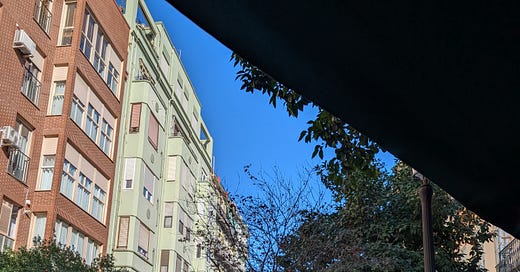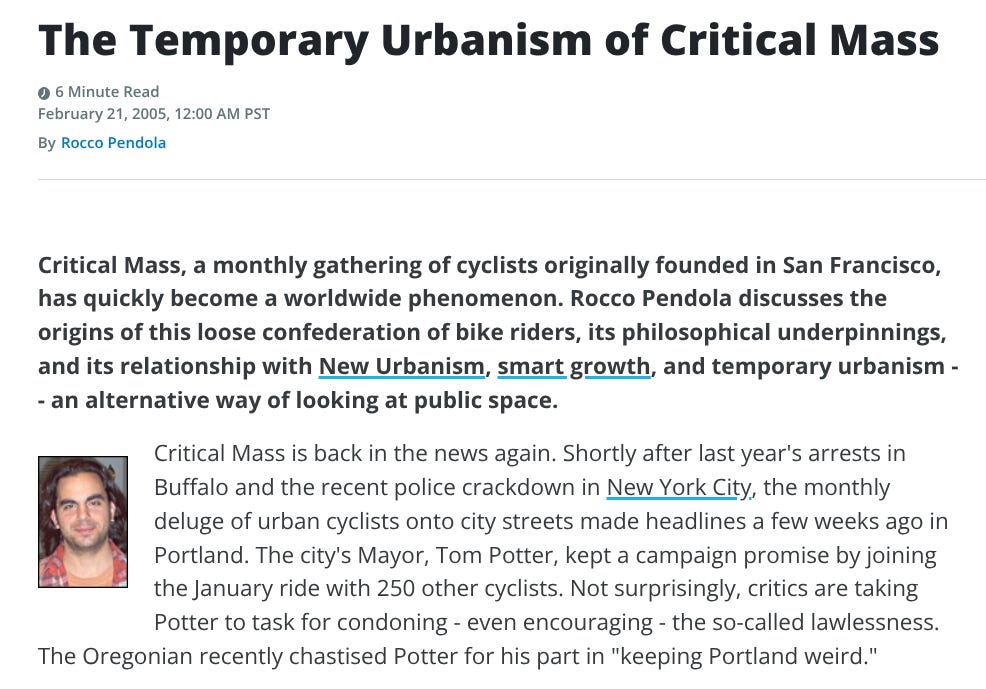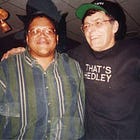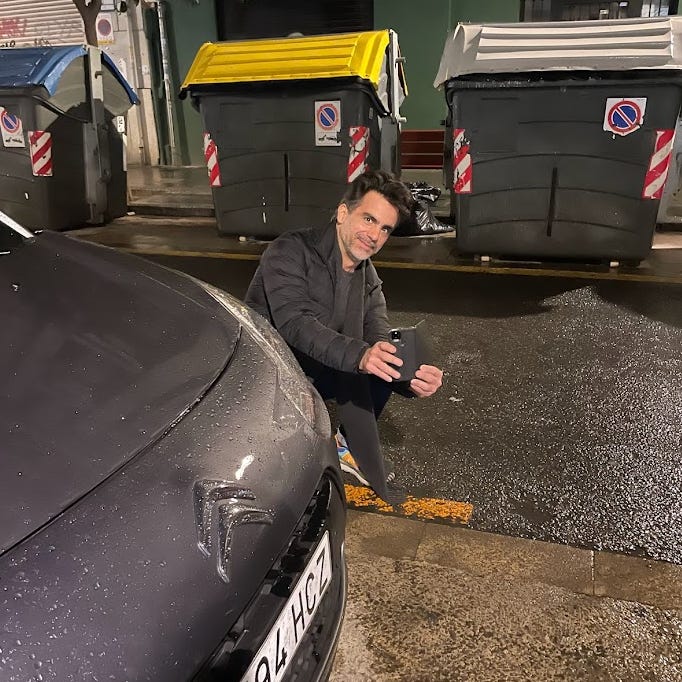As I reread and reconsidered last week's story about my work schedule here in Spain, I concluded that it makes sense to provide what seems like minutia. The seemingly meaningless details.
Because it's not only the finer points—and the attention to them—that matter, but how working with relative ease is the ultimate goal if you aim to Never Retire.
It seems that people like the details.
First, I absolutely do operate from an advantage.
I started writing online a long time ago. The first article I recall getting published turns 20 this month! My daughter was one year old. Now, she’s 21. If something saw the light of day prior to that, I don’t remember. But I was definitely laying the groundwork to be a writer—during my college career—even if I didn’t know it.
In case you question my longstanding obsession with living in a city like Valencia one day! San Francisco came close, but sort of like Mexican food in Spain comes close to Mexican food in Los Angeles (it doesn’t!), San Francisco can’t compare to Valencia on pretty much all urban and quality of life attributes.
More on that—the food and quality of life comparisons (even though I said I wouldn’t compare)—soon, but to the point. I would have had a much more difficult time—and likely failed—carving out a writing career had I started three or even five, 10 years ago.
As it turns out, writing is the perfect job if you’d like to Never Retire the way I conceptualize and operationalize it. Which is probably the reason why so many people are taking it up. For me, it was a mix of luck, right place/right time and the reality that I was drawn to this type of work from a young age.
I tell the story in
’s excellent Medium publication, The Riff, but I became obsessed with (see a pattern here?) and started working in radio at a young age (13, all the way back in 1988, to be exact). Howard Stern was my idol. And he should be yours too.Stern is a great story. Watch the movie Private Parts. He is one of the few high-profile people in show business who became emotionally mature in front of us, realized the errors in his ways and evolved into the great interviewer and entertainer he is today. Not that he wasn’t before. But, at least now, he isn’t needlessly raunchy and terrible to other human beings in the process.
Anyhow—Stern always said that his life is his show. I worked with a guy in Pittsburgh—I miss Doug Hoerth every day—who said that his life is his show and his show is his life.
There’s an important distinction to draw there. One that, if my old friend Uncle Dougie had consciously acknowledged, might have saved his life.
When you relay information and entertainment to others, the goal is to do it in an authentic and conversational way. As if you’re having a conversation about shit with one other person. That’s how I try to treat this newsletter. The easiest and best way to do this is to write about your life, relating it to bigger, more universal themes and current events.
The problem with Doug is that he didn’t have a life. His show was his life. And it was a good show where he talked about his life. But it was really the life of a guy who had little more than radio and would die if he wasn’t on the radio. And he did, shortly after losing his last show.
Stern might have been like Doug early on. I don’t know. But that’s a small detail. The point is that—especially over the last few years after deciding to move to Europe—I have doubled down on the idea that my life is my show so that my show doesn't become my life.
It’s a seamless process. Consider the schedule I presented the other day. It’s important.
Wake up around 7:00 a.m.
Start working before 8:00 a.m.
Write a newsletter post (or edit/proofread one)
Write one or two other pieces of content.
If this new client sends me something, it comes first after the newsletter is set.
Next—depending on the flow of things, it’s either the investing newsletter I write for a client in the US or a Medium article.
Work on any other things I have or want to have going.
Do administrative tasks, such as what I just briefly stopped to do a few seconds ago. That is, I checked the website for apparently difficult-to-secure appointments for our TIE cards, which are proof of residence cards for foreigners. And I booked back-to-back appointments for Melisse and I in late March!
I have been finishing all of the above by between 11 a.m. and 1 p.m. most days. So that’s a 3-to-5 hour work spurt that I have been doing most mornings of the week. I do not work much, if at all, the rest of the day. We often come back to our temporary apartment to rest in the middle of/late afternoon. At that point, I might have to talk to somebody over video call for a few minutes, answer emails and touch up a story or two. But, as all of the above averages out, I am working roughly 24-to-28 hour weeks.
When we’re out doing things we need to do and enjoying Valencia—living this truly urban lifestyle—I am taking notes and writing stories in my head. Sometimes I actually send myself a text or jot something down in Google Keep, but, more often that not, these are mental notes.
There are times when I am able to casually construct a title, subtitle, article introduction, outline and solid closing paragraph that ties everything together during a few minutes on a street or during/just after an experience that inspires me. And it’s all real, raw and on the ground because I am living it—real, raw and on the ground.
I don’t sit down to write. an. article.
I tell a story that flows naturally from my experience of life. Of going through it. As if I couldn’t wait to see you, sit down, order the coffee and tell you what happened or what’s on my mind.
The goal for the—your—ultimate Never Retire lifestyle is to find something you can do something like this with. Of course, it’s not going to look exactly like this. But it’s about finding something that seamlessly flows with your life because, in some respects, it is your life. And, to make money from it, you only need to sit down and work sort of hard for a few hours a day because you already did much of the dirty legwork.
For creatives like my wife or people who work in food and drink, it’s different. When you’re building and creating physical products, it’s a whole different ballgame time and schedule-wise. However, the element of getting good at what you do so you can be super efficient and spend more of your time living remains. That’s universal. Or, at least, it should be.
To execute my schedule, I work in bite-size chunks. For me, chunks are articles or stories. Each day, I say I need to write a story or article for this and a story or article for that. I do it—usually two a day, but sometimes one or three—and I am done.
Simple as that.
As I was writing this, I stopped multiple times to check for appointments for an administrative task in Spain, review Medium/Substack engagement and survey flight prices for the trip we’re taking with our daughters in May/June.
I’m doing it all a bit earlier in the morning than I would like. But I think once we get this apartment hunt out of the way, things will start to shift to something I am 100% satisfied with and will likely include waking up and staying out a little later.










The art of telling a story as you are living it "As if I couldn’t wait to see you, sit down, order the coffee and tell you what happened or what’s on my mind" is how I tend to go about it. I question that style with myself though. Although I tend to write like I am talking to friends, I worry I don't sound professional enough.
I appreciate you divulging how it works for you. I find similarities in how I take notes, write little blurbs, turn them into stories by elaborating on the topics I scribble down -which makes me feel more confident. Maybe I need to just start putting my writing out there, and maturing as I go.
Thanks for the kind words and shout out! For anyone scrolling the commentss, the story Rocco mentions is pretty cool, and well worth checking out.
Work-wise, I do best when it's in chunks/blocks. Not in any Pomodoro- style way, but if I know that I'll be writing from 10-1, and checking admin stuff from, say 1-3, then my day seems to flow a lot better. I need that sort of structure to be creative, which seems weird to type...
Huge +1 to conversatinal style writing as well. There's a place for objective, sterile writing, but I'm not currently in it.
P.S. That pic of the Vista Ridge tunnel is wild! I can't imagine NOT being in a car in there.